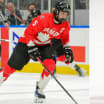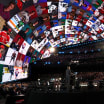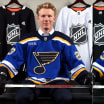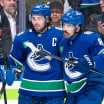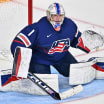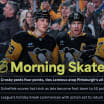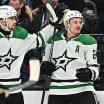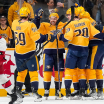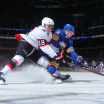BOSTON -- Scott Young knows what it is like to be part of an influx of talent. He was there in 1996 on the USA Hockey roster that won the World Cup of Hockey, part of a group of American players that would come to be known as the greatest generation, one that included Pat LaFontaine and Brian Leetch and Mike Modano and Keith Tkachuk.
He sees something familiar happening now.
U.S. Hockey Hall of Fame inductees see bright future for game
Matthews, Eichel among next generation developed by USA Hockey
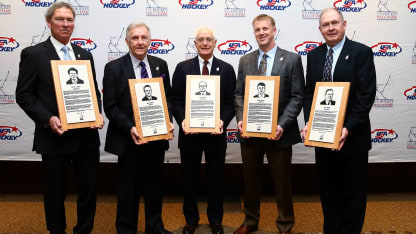
"USA Hockey has done such a tremendous job," said Young, who was inducted into the U.S. Hockey Hall of Fame on Wednesday. "I think you see right from the grassroots of it now when you look at the ADM American Development Model], the NTDP [National Team Development Program]. There's a clear path now.
***[RELATED: [Young proved versatile, valuable en route to USHHOF | Wilson gets USHHOF nod -- again]*
"Right now, USA Hockey is in the hunt for all the gold medals in the world championships at every level. They've obviously done it right, and I think there are a lot of countries that are trying to copy the U.S. now."
It was a hot topic amongst the inductees to the U.S. Hockey Hall of Fame. In addition to Young, Ron Wilson, the all-time winningest American head coach in NHL history;
Jack Parker, the longtime Boston University coach
; Ben Smith, who served as head coach of the 1998, 2002, and 2006 women's Olympic teams; and Kevin Collins, who officiated more than 2,000 NHL games, were honored.
Peter Lindberg
and Dave Ogrean received the Lester Patrick Trophy for outstanding contribution to hockey in the United States.
For Ogrean, the
executive director of USA Hockey from 1993-99 and 2005-17
, it's gratifying to see what is happening. This is what he worked for all those years. Now, it's blossoming.
"There's a difference between having players good enough to be in the League and players that are the ones talked about and making a real difference," Ogrean said. "I think the last couple of years we've had guys selected at the very top of the draft, [Jack] Eichel, No. 2, Auston Matthews, No. 1.
"We're optimistic about the future, so I think we might be on the front end of 'Greatest Generation 2.'"
Part of that is the expansion of the game into places that were nearly unthinkable in past years.
"One of the things [NHL Commissioner] Gary Bettman has always gotten a kick out of is to look at our national team roster when we have the junior team or the world championship team, the Olympic team, and how many states are represented," Ogrean said. "Because if you go back to the '70s, it was basically the three Ms: Massachusetts, Michigan, Minnesota. It is much more of a national game now than it used to be."
That includes Florida. It includes Southern California. It includes Arizona, and Matthews.
"You've got the spread of the NHL in what people have called for a while in the nontraditional markets], but I don't think they can say that too much longer because there are kids coming out of Florida, kids coming out of Texas, there are kids coming out of California," Smith said. "That's the biggest thing that I've seen is just the width and breadth of hockey in America. I think USA Hockey is riding that wave."
And it has proven fruitful.
"Just in the last few years to see as many Americans dominating the NHL, and especially someone like Auston Matthews, who I had the pleasure of coaching in the world juniors a couple years ago, that's a real mark," Wilson said. "When you think back when I started, Americans were just a second thought to a lot of people, and it was my goal, and at least I thought in my mind, it would be nice if I could coach someday where America was considered in the same language that the Canadians were."
And that's happening. USA Hockey boasts young stars like Eichel and Matthews, along with Johnny Gaudreau and Clayton Keller, Patrick Kane and Brock Boeser. Those players aren't just great hockey players, they're great athletes, and that's what USA Hockey has been able to capture: players who would be exceptional at any sport they tried.
[RELATED: [Passion for women's hockey fueled Smith | Collins thrilled by USHHOF nod]
Fortunately for hockey, they picked up a stick.
"You're not going to have a good player unless you get a good athlete, and we're obviously getting better athletes, great athletes," Smith said. "I think that was kind of the tip of the '96 team, to see those guys and how they projected, what they had for the sport and what athletes guys like Brian Leetch -- he was a great baseball player -- and all the guys on that team, the Chris Drurys of the world."
And while it might be too soon to declare the next greatest generation of American hockey, it's easy to see how that team led to this team, how what they did then has led to what they're doing now, with a lot of hard work from a lot of people in the interim.
"We were coming off the greatest generation of Pat LaFontaine and Mike Modano, Chris Chelios and people like that, but we felt going forward, given what could be the growth of the game in our country, our population in this country, the fact that hockey had so much head room to grow that we should have a much higher percentage of Americans in the League, and now we do," Ogrean said.
"It's dramatically more than it was 10 or 15 years ago, and now to see a lot of these guys that are out there today, like Jack Eichel and Patrick Kane and Auston Matthews, it's extremely exciting. Because it's not just the number of players, it's the number of impact players."


